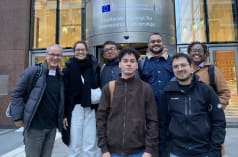Activists criticize IPCC support for "false solutions"
 Biofuels - a false solution to climate change
Biofuels - a false solution to climate change
Apr 13, 2014
Today, the Intergovernmental Panel on Climate Change (IPCC) released its "Summary for Policy Makers”. Climate, energy and social justice groups commend the IPCC for clearly acknowledging the link between economic growth and increased greenhouse gas emissions but warn that the report falls far short on translating this insight into pathways to mitigation.
The groups are particularly concerned that large-scale bioenergy and biofuels, waste incineration, nuclear power and carbon capture and storage (CCS) are referred to as “low carbon” in mitigation models, despite concerns raised elsewhere that some of those technologies are risky, unproven and could actually make climate change worse. They are also decry IPCC’s support for increased use of fossil gas over the next few decades and by their endorsement of failed market mechanisms, including cap and trade.
Tom Kucharz, Ecologistas en Accion asked: “Why did IPCC include natural gas as climate mitigation, despite growing evidence that methane emissions make fracking as bad or worse for the climate even than coal? How can IPCC seriously consider nuclear power to be an acceptable choice even as we are facing the consequences of the Fukushima disaster? And how can they class waste as a climate-friendly fuel for incinerators and cement plants when it results in toxic air emissions and increases overall resource and such energy use? Such claims are indicative of the narrow obsession with carbon accounting that disregards planetary systems and biodiversity, human rights, public health and, even methane emissions in the case of natural gas.”
Rachel Smolker of Biofuelwatch and the Global Forest Coalition further elaborates: “The IPCC’s position on bioenergy is confused: They acknowledge concerns that large-scale bioenergy can increase emissions, destroy livelihoods and damage the environment. Yet they still class it as ‘low-carbon’ and even refer to bioenergy with carbon-capture and storage (BECCS) as a credible means of removing carbon from the atmosphere which they deem essential to meeting stabilization targets. It is a shame they put so much stock in something that would make things worse rather than better.”
Teresa Perez, World Rainforest Movement, adds: “The IPCC lists cap and trade and “Reducing Emissions from Deforestation and Degradation” (REDD) amongst potential policy solutions, in spite of the fact there is no convincing evidence at all that either have reduced emissions. Market mechanisms only lead to further privatization and land grabs - and leave our future to the whims of financiers.”
The groups call for a more holistic assessment of real climate change solutions, not more “Business As Usual” economic analyses that imply we should accept a dead planet, or the suffering of millions if it is “more affordable.” Real solutions must actually work. Also they must respect human rights and the rights of nature, protect the planetary systems on which continued human existence depends, put control over energy, food and water in the hand of accountable local stewards, fairly address overconsumption to meet basic needs for all, not just the greed of a wealthy few.
Achieving real mitigation requires breaking free from the oppressive pressures of a globalized economy and a deregulation program that only serves the wealthy corporate elite while sacrificing people and the planet’s ecosystems.
Contacts:
Rachel Smolker, Biofuelwatch/Global Forest Coalition, Tel ++ 1 802 482 2848 or ++1 802 735 7794 (US), rsmolker@riseup.net
Teresa Perez, World Rainforest Movement, Tel ++598-2413-2969 (Uruguay), teresap@wrm.org.uk
Almuth Ernsting, Biofuelwatch/Global Forest Coalition, Tel =.++44-131-6232600 (UK), almuthbernstinguk@yahoo.co.uk










